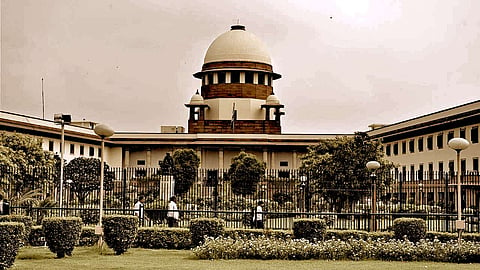Nirbhaya Case: Supreme Court dismisses death convict Mukesh’s plea against rejection of mercy petition
[dropcap]T[/dropcap]HE Supreme Court today dismissed a petition filed by Mukesh- one of the death convicts in Nirbhaya case challenging the rejection of his mercy petition dated January 14, 2020, by the President of India Ram Nath Kovind on January 17, 2020.
A three-judge bench of the Supreme Court comprising Justices R Banumathi, Ashok Bhushan and A S Bopanna held that delay in disposal of mercy petition might be a ground calling for judicial review of the order passed by the President but the quick consideration of the mercy petition and swift rejection of the same could not be a ground for judicial review of the order passed under Article 72 and 161 of the Constitution. "Nor does it suggest that there was pre-determined mind and non-application of mind", said the court.
The court also held that there was no merit in the contention that the relevant materials were kept out of the consideration of the President.
Mukesh is a death row convict in Nirbhaya's case, which relates to the gangrape of the victim in the moving bus in Delhi on the night of December 16, 2012.
The death convict-Mukesh had challenged the decision of the President turning down his mercy petition on the following grounds:
- Relevant materials were not placed before the President of India and they were kept out of consideration while considering the mercy petition;
- The mercy petition was rejected swiftly and there were pre-determined stance and complete non-application of mind in rejection of the mercy petition; 1
- Solitary confinement of the petitioner for more than one and half years due to which the petitioner has developed severe psychiatric ailments;
- Non-consideration of relevant circumstances like prisoners' suffering in the prison and consideration of extraneous and irrelevant circumstances; and (v) Non-observance of established rules and guidelines in considering the petitioner's mercy petition.
The Court said "to satisfy ourselves, we have perused two files containing the communications of the Ministry of Home Affairs, NCT of Delhi and the office of Lieutenant Governor and the file containing the note put up before the President of India. From the covering letter dated 15.01.2020 from NCT of Delhi addressed to Deputy Secretary (Judicial), Ministry of Home Affairs, it is seen that all the relevant documents viz., the judgment of the trial court, High Court and the Supreme Court and legible and clean copy of records of the case and the details of the review/curative petitions filed by the petitioner and other co-accused along with the present status and other details of the petitioner like past criminal history, economic condition of the family of the petitioner and the recommendation of the Government of NCT of Delhi were all sent by the NCT of Delhi along with mercy petition to be placed before the President of India".
The Court, thus, noted "by perusal of the note, we have seen that all the documents were taken into consideration and upon consideration of the relevant records and the facts and circumstances of the surrounding crime, the President has rejected the mercy petition. There is no merit in the contention that the relevant materials were kept out of the consideration of the President".
On the issue of the absence of recommendation of the Superintendent, Tihar Jail, the court noted: "though Column No.23 relates to recommendation by the Superintendent, Tihar Jail, the word "if any" indicates that the Superintendent may or may not give his remarks/recommendations. That apart, as rightly contended by the learned Solicitor General, considering the high position of the President of India and the constitutional duty which the President is discharging, it may not be appropriate for the Superintendent to make the recommendation nor was it necessary for the authorities to call for the opinion of the Jail Superintendent as to the subsequent conduct of the prisoner while in prison unless the situation warrants".
On the allegations of the petitioner was that he was beaten up in the prison and sexually harassed and was suffering every day in the prison, the court held that the alleged sufferings in the prison cannot be a ground for judicial review of the executive order passed under Article 72 of the Constitution rejecting the petitioner's mercy petition. Court also rejected the argument that Mukesh was kept in solitary confinement
As per the death warrant issued by Sessions Court, the execution of the warrant is scheduled for February 1, 2020, at 6 am. On January 14, 2020, the Supreme Court had dismissed his curative petition.

